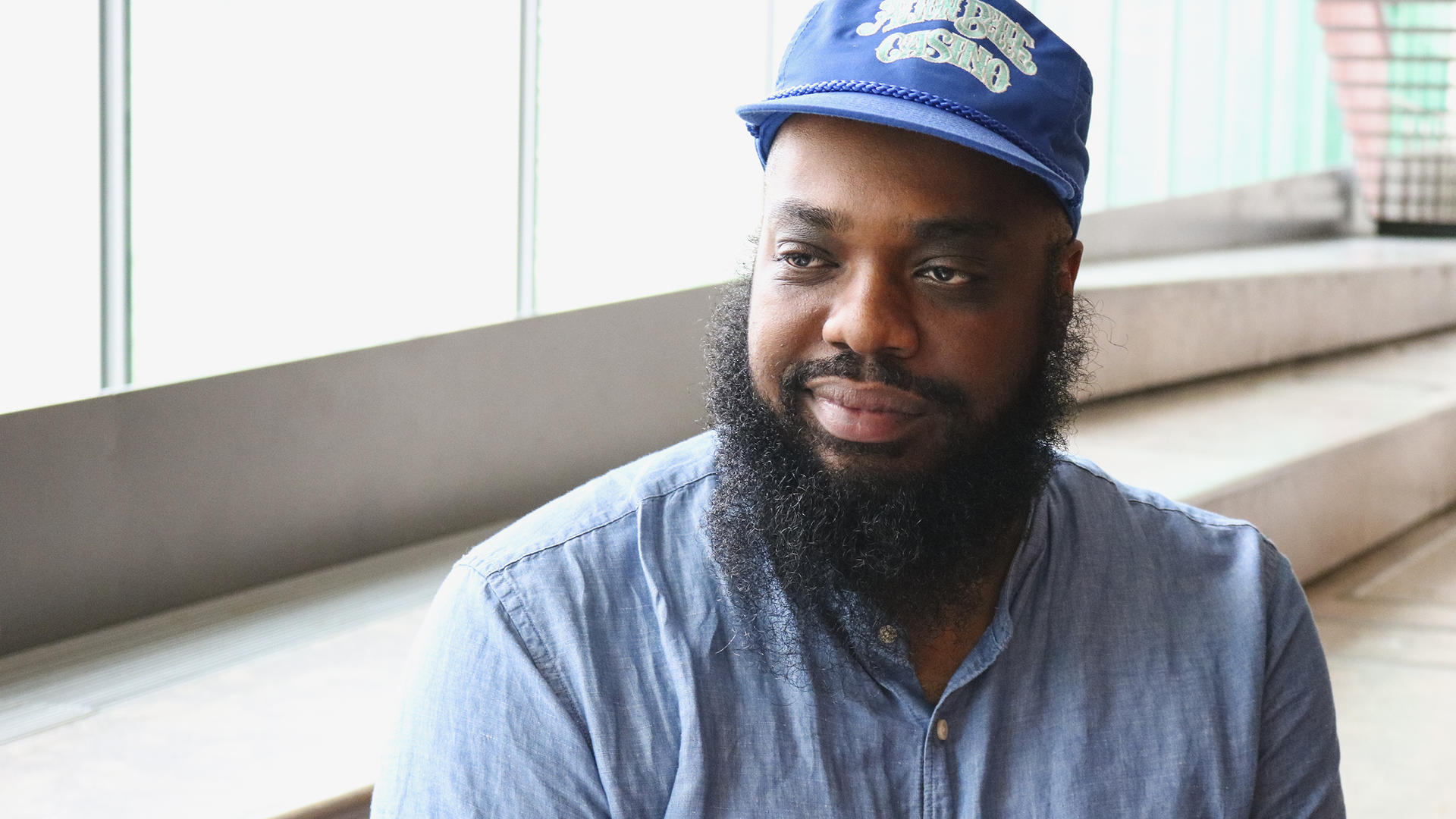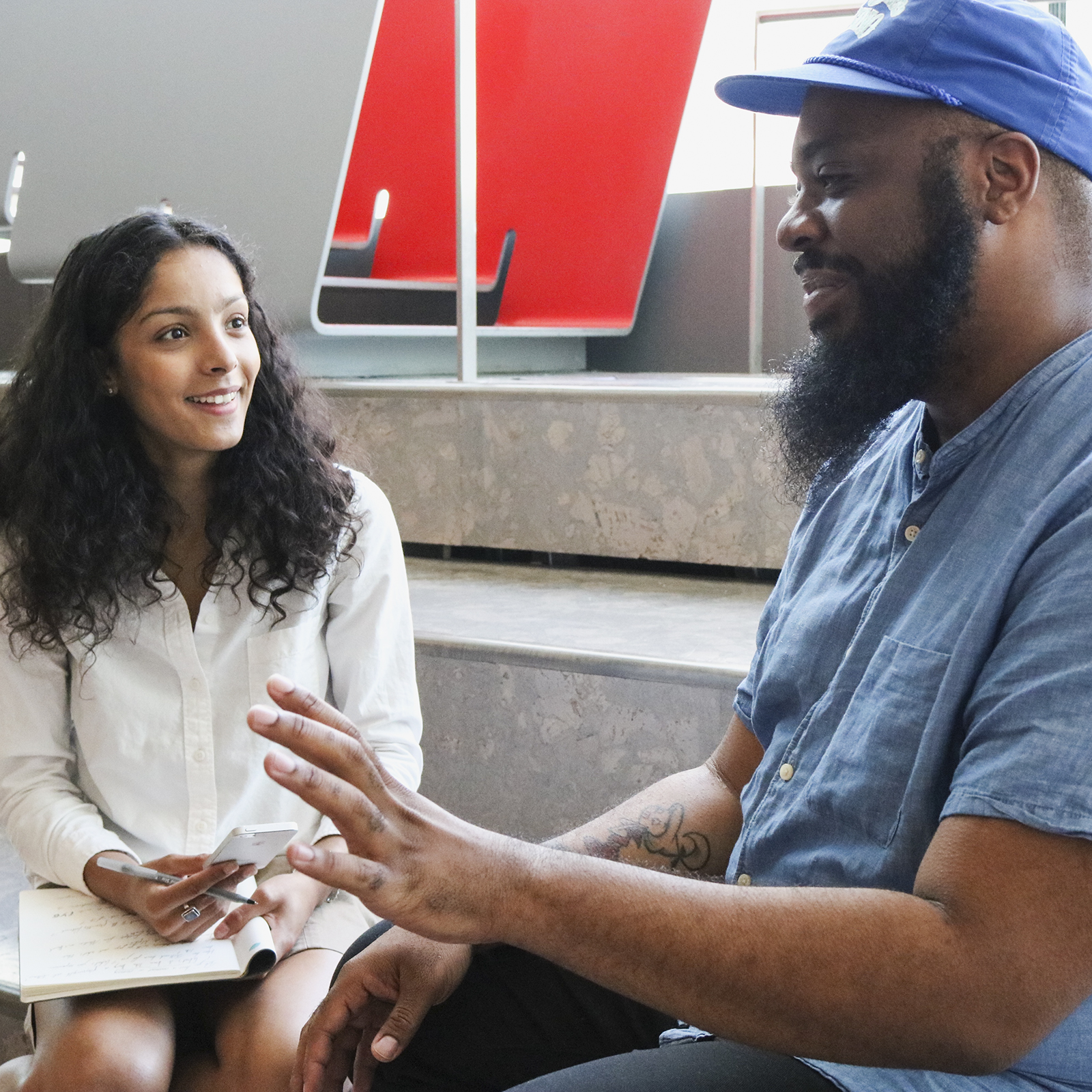
Third-year actor Hannah Rose Caton recently spoke with second-year playwright Tearrance Arvelle Chisholm about writing, Juilliard, and the Playwrights Festival (Sept. 6-9), in which works in process by the current playwriting fellows are performed by student actors. Tearrance will be the first playwright to direct his own play (called P.Y.G.) in the festival, now in its 11th year. The other festival plays are Krista Knight’s Lipstick Lobotomy (directed by Jess Chayes) and Madhuri Shekar’s The House of Joy (directed by Zi Alikhan).

Playwright Tearrance Arvelle Chisholm and I make ourselves comfortable near the staircase outside the Willson Theater and he confesses he was confused when I suggested we meet here, saying, “Red stairs? I think the last time I came here was on my tour.” We both laugh—I thought I was shut off from the world; the playwrights must really be playing a different ball game. Which isn’t to say we hadn’t crossed paths—Tearrance’s play Black Lady Authority gained a lot of excitement last year during Play Lab, a weekly Drama Division tradition in which actors and playwrights come together to listen and share feedback on a play.
Tearrance said one of the highlights of the Lila Acheson Wallace American Playwrights Program has been collaboration. Being with the other writers is “kind of competitive but it’s not—it’s like standing up to the room and being a part of the room, and that has been the best.” As for working and hanging out with program co-directors Marsha Norman and David Lindsay-Abaire (Playwrights ’98), “you couldn’t ask for better teachers,” Tearrance said. “It’s kind of like a comedy show in a lot of ways. Marsha is the funny woman and David is the straight man—they really balance each other out. But they also figure out what kind of theater you make, and they hold you accountable for that. They’re not imposing what they think a play should be or how they think a play should be structured. Plus they’re award winning playwrights so it’s good to have their eyes and ears, and having them read our scripts is awesome.”
When he got here, Tearrance said he was sometimes hesitant to own what his work was, but that he’s not “making excuses anymore for the things that I want to do. My style hasn’t changed much but my intent is a lot different.”
"I want to have actors be able to play parts that tell true stories of black people—it shouldn’t be just stereotypes."
Before we started talking, I wondered how much of Tearrance’s path-to-Juilliard story was luck and magnificent talent and how much was ambition and hard work. As an undergrad, he started out studying graphic design while writing plays for fun in the summer with friends. An accidental submission led to first prize at the American Kennedy Center for Playwriting, and then at grad school at Catholic University, he met Nathan Allen Davis (Playwrights ’16), who encouraged him to apply to Juilliard’s playwriting program. Still, Tearrance is relaxed and humble about his achievements, and, actor to writer, we talk about the Drama Division and collaboration between the playwrights and actors, which he wishes there were even more of. That’s part of the reason he’s taken on directing his own play at the festival, he said, explaining that he wanted “to find people who I’m inspired by to help me flesh out the work—and to help them.”
Tearrance is looking forward to collaborating with the actors when he directs P.Y.G. in the festival—“that collaboration can really change the course of a play,” he said, noting that he wants to “seize this opportunity to experiment” since “this is a great place to fail.” I second that!
Tearrance talks about the responsibilities he feels as a playwright, including “portraying blackness and how I want to have actors be able to play parts that tell true stories of black people—it shouldn’t be just stereotypes,” he said, noting that he wants to provide “concrete things to fully immerse themselves in that are actually representative of actual blackness.” This emboldens me—as a woman of color I can relate to often reading material that would rather present me as a stereotype instead of showing my full humanity.
After we spoke, Tearrance—who finds his inspiration from Pygmalion and Family Guy to his own family—left for London, Texas, and Sundance for professional obligations; after that, it would be time to start getting ready for the festival and the school year, which he plans to use “to work on the plays I’m afraid of writing.” He also hopes to be able to take time to enjoy his journey. “I’ve spent a lot of time looking forward instead of looking around me and finding the positives,” he said. “Being ambitious can make you not be happy about things but I have a lot to be happy about. There’s a lot to recognize and to stop being hard on yourself.”